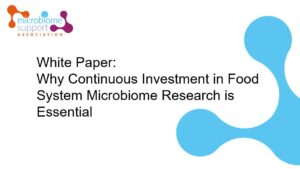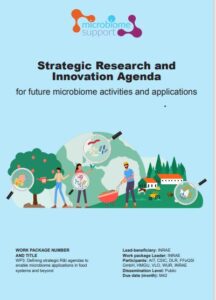Explore a collection of key reports and documents produced by our Association, offering valuable insights and information on a range of topics related to the food system microbiomes. To access the full text, simply click on the image.
 MicrobiomeSupport Annual Report 2023/2024 (March 2025)
MicrobiomeSupport Annual Report 2023/2024 (March 2025)
We are excited to share our first Annual Report, reflecting on the progress and growth of our Association, which was established in November 2023. In 2024, we made significant strides in strategic development, with a focus on expanding our membership base and increasing outreach. One of the key achievements was the successful Food System Microbiomes International Conference held in Torino, Italy, from May 14–17. Additionally, two task forces were established to support achievement of our goals and drive our conceptualised initiatives forward.
 White Paper: Why Continuous Investment in Food System Microbiome Research is Essential (December 2024)
White Paper: Why Continuous Investment in Food System Microbiome Research is Essential (December 2024)
Microbiome research has revolutionised our understanding of health, agriculture, and the environment, but the potential is far from fully realised. Microbiome research is revolutionising the way we grow, process, and consume food. From improving quality and nutrition to reducing waste and enhancing sustainability, the transformation to a sustainable food system in the face of climate change and other societal challenges can be mediated by microbiomes.
This document highlights the transformative potential of microbiome research in reshaping global food systems. It also outlines key gaps that need further exploration. Dive into this essential read to understand how continued investment can drive the future of food systems and sustainability.
 MicrobiomeSupport CSA Strategic Research and Innovation Agenda for future microbiome activities and applications (April 2022)
MicrobiomeSupport CSA Strategic Research and Innovation Agenda for future microbiome activities and applications (April 2022)
‘Microbes orchestrate life on earth’: such an assertion feels more philosophical than scientific. But microbial communities – known as microbiomes – are indeed the largest contributors to the earth’s biosphere diversity. Microbiome research has dramatically increased in recent years, yielding a myriad of new insights into microbial communities, their interactions, and effects, both in close association with their host and in larger systems. Beyond the emphasis on human health and well-being, recent evidence has pointed to the potential of microbiomes to address other ongoing challenges, notably those regarding food systems (including soil fertility, plant and animal nutrition and health, food security, waste management) and climate change adaptation and mitigation (including carbon sequestration and greenhouse emissions reduction). With the spectre of climate change looming and a global population predicted to reach almost 10 billion by 2050, developing a resilient, sustainable, and inclusive food system in line with the European Commission’s (EC) Food 2030 framework is imperative.
The Strategic Research and Innovation Agenda (SRIA) was developed in the scope of MicrobiomeSupport Coordination and Support Action project through an open and transparent process based on knowledge sharing, brainstorming sessions, workshops, and a two-round online Delphi survey. This survey was scored by experts in the field and a cross-sectoral community interested in understanding food systems-related microbiomes and harnessing their potential in a sustainability- and bioeconomy-focused approach.
